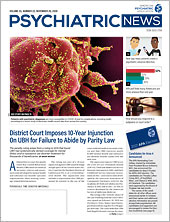Zuranolone Shows Promise for Major Depressive Disorder
The investigational medication zuranolone may reduce depressive symptoms in people with major depressive disorder, suggest the results of a phase 3 open-label trial. Sage Therapeutics, manufacturer of zuranolone, announced the results in October.
The SHORELINE study followed adults with major depressive disorder—defined as a Hamilton Rating Scale for Depression-17 (HAMD-17) score of equal to or greater than 20—for up to one year. The trial initially included treatment with only 30 mg of zuranolone. However, patients who initially started treatment at that dose and were retreated after May started receiving zuranolone 50 mg rather than 30 mg. A new cohort of patients who started treatment with 50 mg also joined the study in May.
At the beginning of the trial, 725 patients were treated with 30 mg of zuranolone a day for 14 days. Of those, 143 did not respond to the medication and left the study. Among patients who did respond to the medication and who received only 30 mg of zuranolone throughout their participation in the study, HAMD-17 scores dropped a mean of 15 points by day 15. Among patients who joined the study in May and who took only 50 mg, HAMD-17 scores dropped a mean of 16 points by day 15.
Side effects in both the 30 mg cohort and the 50 mg cohort included sleepiness, sedation, headache, and tremor. However, these side effects occurred more frequently in the 50 mg cohort.
FDA Reviews Rimegepant for Migraine Prevention
In October the U.S. Food and Drug Administration accepted for review Biohaven’s supplemental New Drug Application for rimegepant (Nurtec ODT) for the prevention of migraines. The medication is already available for the acute treatment of migraine.
In a phase 2/3 study, 695 adults with migraine were randomized to either 75 mg rimegepant every other day or placebo for 12 weeks. In the final four weeks of the study, patients in the rimegepant group experienced a 4.3-day reduction from baseline in monthly migraine days, compared with a 3.5-day reduction in the placebo group. Roughly half of patients in the rimegepant group had at least a 50% reduction from baseline in the mean number of moderate to severe migraine days per month compared with 41.5% in the placebo group.
The most common side effect, as shown previously in a study about rimegepant’s safety and tolerability, was nausea, which occurred in less than 2% of patients who took the medication.
Neflamapimod May Improve Cognition in Dementia with Lewy Bodies
EIP Pharma Inc. in October announced the results of its phase 2 AscenD-LB study of neflamapimod for improving cognition in patients with mild to moderate dementia with Lewy bodies.
In the trial, 91 patients were randomized to receive 40 mg neflamapimod capsules or placebo for 16 weeks. The dosing regimen was based on weight, with study participants weighing less than 80 kg receiving capsules twice per day and those weighing at least 80 kg receiving capsules three times per day.
The primary objective was to evaluate the effect of neflamapimod on cognition as assessed in a study-specific Neuropsychological Test Battery (NTB). Patients in the neflamapimod group who took the medication three times per day experienced significant improvement on the NTB compared with those who received either placebo or neflamapimod twice daily.
FDA Warns Against High Doses of Diphenhydramine
In September the FDA issued a drug safety communication warning that taking higher than recommended doses of diphenhydramine (Benadryl) can lead to heart problems, seizures, coma, or death. The warning follows reports of adolescents visiting hospital emergency departments or dying after participating in the “Benadryl Challenge,” which encourages people to take large doses of the antihistamine to cause hallucinations.
“Health care professionals should be aware that the ‘Benadryl Challenge’ is occurring among teens and alert their caregivers about it. Encourage teens and caregivers to read and follow the Drug Facts label,” the drug safety communication states. “In the event of an overdose, health care professionals should attempt to determine whether a patient with a suspected overdose took diphenhydramine.” ■
